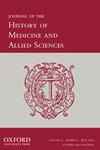20 世纪 80 年代校园中的安全性行为和关于安全套的争论:哈佛大学的精子克星和德克萨斯大学奥斯汀分校的保护联系
IF 0.4
3区 哲学
Q4 HEALTH CARE SCIENCES & SERVICES
Journal of the History of Medicine and Allied Sciences
Pub Date : 2024-09-14
DOI:10.1093/jhmas/jrae016
引用次数: 0
摘要
20 世纪 80 年代,美国大学生帮助消除了分发和使用安全套的污名。他们将目标从预防意外怀孕转移到阻止性传播感染(包括新发现的获得性免疫缺陷综合症(艾滋病))的传播。马萨诸塞州剑桥哈佛大学和德克萨斯大学奥斯汀分校的两项由学生领导的下班后发放安全套的活动表明,随着人们对艾滋病认识的提高,性风俗在地区和时间上也出现了差异。在特洛伊® 品牌安全套的营销力度加大的背景下,这些男生采取了一种非药物干预措施来预防怀孕和疾病。对联合创始人的访谈揭示了这些学生是如何应对家庭成员和校园管理人员对他们普及安全套不太热心的反弹的。联合创始人描述了媒体关注如何影响他们的大学生活,以及安全套公司如何改变校园文化。总体而言,随着 1985 年至 1987 年间人们对艾滋病认识的提高,特洁安® 等大型非制药公司以及哈佛大学和德克萨斯大学奥斯汀分校等小型安全套销售商重塑了有关安全性行为的文化规范。本文章由计算机程序翻译,如有差异,请以英文原文为准。
Safe Sex and the Debate over Condoms on Campus in the 1980s: Sperm Busters at Harvard and Protection Connection at the University of Texas at Austin
During the 1980s, college students in the United States helped to destigmatize the distribution and use of condoms. They shifted their aims from preventing unwanted pregnancy to stopping the spread of sexually transmitted infections including the newly identified acquired immunodeficiency syndrome (AIDS). Two student-led initiatives to deliver condoms after hours at Harvard University in Cambridge, Massachusetts and the University of Texas at Austin show regional and temporal differences in sexual mores as awareness of AIDS increased. These male students adopted a non-pharmaceutical intervention to prevent pregnancy and disease in the context of increased marketing of Trojan® brand condoms. Interviews with co-founders reveal how the students grappled with backlash from family members and campus administrators less enthusiastic about their popularization of condoms. Co-founders described how media attention affected their college experiences and how condom companies changed campus culture. Overall, large non-pharmaceutical companies such as Trojan® and small condom-resellers such as those at Harvard and the University of Texas at Austin reshaped cultural norms around safe sex as awareness of AIDS grew between 1985 and 1987.
求助全文
通过发布文献求助,成功后即可免费获取论文全文。
去求助
来源期刊

Journal of the History of Medicine and Allied Sciences
管理科学-科学史与科学哲学
CiteScore
1.00
自引率
0.00%
发文量
40
审稿时长
>12 weeks
期刊介绍:
Started in 1946, the Journal of the History of Medicine and Allied Sciences is internationally recognized as one of the top publications in its field. The journal''s coverage is broad, publishing the latest original research on the written beginnings of medicine in all its aspects. When possible and appropriate, it focuses on what practitioners of the healing arts did or taught, and how their peers, as well as patients, received and interpreted their efforts.
Subscribers include clinicians and hospital libraries, as well as academic and public historians.
 求助内容:
求助内容: 应助结果提醒方式:
应助结果提醒方式:


